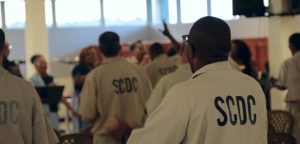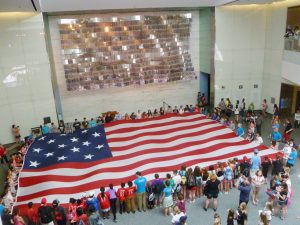America’s birthday comes at a good time this year. In the midst of escalating cultural and political tensions, the Supreme Court resignation of Justice Kennedy has thrown gasoline on an already hot fire. The anniversary of our founders love for America and their great sacrifice to establish and protect it calls us to recommit ourselves to the same love and sacrifice. How? Quite simply…
…every one of us can take time from our busy schedules to serve and pray.
Many of us as evangelical Christians tend to live in suburban bubbles isolated from the people who cannot afford to be our neighbors. July 4th calls us to love America by reaching out to fellow citizens who need our time and attention, our prayers and our touch.
Our normal default is to focus our service on our families and our churches. But we can’t just fiddle while Rome burns. We need to challenge ourselves to reach outside our bubble and serve the very people that the Lord Jesus loved to touch. The very people whose needs are often championed by political activists with whom we disagree. Refugees. Prisoners.
What has the Lord gifted you to do? How can you take it to people at the margins?
Here in Columbia, South Carolina I have the privilege to go into prison with a team from Columbia International University. Once a quarter we take in a meal for about 40 prisoners and eat with them. One of the guys last Wednesday said “This is so good. I haven’t eaten fried chicken in 20 years.”
 Afterwards we circle up and listen as one sings an acapella song of worship and encouragement and another tells a story about how God is working in his life–simply amazing stories of finally having peace over a life sentence, breaking down walls of mistrust, finally getting a visit from a granddaughter born five years ago (but it took that long to get her on his visitor list)–real-time snapshots of lives being changed. Prayers being answered.
Afterwards we circle up and listen as one sings an acapella song of worship and encouragement and another tells a story about how God is working in his life–simply amazing stories of finally having peace over a life sentence, breaking down walls of mistrust, finally getting a visit from a granddaughter born five years ago (but it took that long to get her on his visitor list)–real-time snapshots of lives being changed. Prayers being answered.
These men have been vetted and invited to be a part of a two-year Associate Arts degree program sponsored and accredited by the University. When they graduate the will be sent out two by two to different prisons around the State where they will be peacemakers, chaplain assistants etc.
 They make a big boots-on-the-ground difference because they’ve learned they are loved and cared for by God and their professors. And they are able to love and care for others well. Their lives have been deeply transformed.
They make a big boots-on-the-ground difference because they’ve learned they are loved and cared for by God and their professors. And they are able to love and care for others well. Their lives have been deeply transformed.
I go to help with these quarterly meals and to speak in chapel occasionally about my focus: faith and culture. I’ll return in two weeks to speak in chapel. There I will hear their reports about their visits to each new inmate processed in to the South Carolina state prison system.
Soon after new inmates pass under the razor wire and hear the metal doors clang shut behind them, these men are in their cells, sharing the grace and forgiveness of Jesus, and helping them process their anger and hurt. Many trust Christ or recommit their lives to him. Such a tremendous privilege and treat for me to hear their stories. Here’s a two-minute overview of what it’s like to bring the peace of Christ inside prison walls:
We can serve
Many of us like the idea of serving more than the actual serving. It’s never convenient. It takes effort and humility to pick up a towel, get down and serve. But the joy of doing something so rich and vital to following Jesus and contributing to the common good of our country is so worth it.
Just watching the news, talking about it, and caring about it, even voting in elections is not enough. We need to be agents of the love of Jesus Christ in our culture. The more we reach out to those with overwhelming needs, the more we understand the complexities and nuances of the things we hear about on the news, the more we are truly part of the solution, not just vexed about the problems.
We can serve and we can pray.
The other night we asked a number of friends gathered in our home, “What are some ways you are praying for our country?” Here are some iron-sharpening-iron answers:
• Just as we “pray for the peace of Jerusalem,” we pray for the peace of America. May God make us peacemakers. In the words we speak and post on social media may we engage with gentleness and respect.
• May God expose injustices that are hidden. And bring truth to light.
• May we take risks to follow Jesus more than political loyalties. In our service to our country may we prioritize investing time, money and passion in knowing and sharing Christ. “Blessed is the nation whose God is the Lord.”
• May God bind our country together; may leaders lead wisely as we navigate the nomination of a new Supreme Court justice. May he or she love the law of our land, as well as God’s law.
• May God still shed his grace on America. May we as a nation turn to him. May God empower us to love our neighbors well. To bind up the brokenhearted and set the captives free.
If we search the Scripture to find how it speaks to cultural and political engagement and healing, these are ways to serve and pray that are close to God’s heart. May they be close to ours.
What are you doing to love and sacrifice for God’s kingdom and our country? What initiatives could you take?
How could you get involved in a prison ministry where you live?
With Columbia International’s Prison Initiative?
How could you get involved in ministry to American victims of human trafficking? Start by reading “Renting Lacy.” (I’m also moving in this direction with a local ministry. This was the first step they recommended. Heart-piercing. I am understanding why these girls/women stay in this bondage. What we can do to help.)
How could you get involved with helping refugees here in America?
Please share some of the things you are doing or thinking about in the comment section below…


Ah yes…words to live by. God help us to do HIS Will.
So exciting to hear of the prison ministry there! There exist boundless areas and ways to serve, right within our neighborhoods. Eg. Our church has Carenet Pregnancy Center, as do most large churches, etc. Also, for me, I LOVE volunteer teaching some of the hundreds of immigrants and other non-English speakers in our community; English is a lifeline for them to work, to engage in the community, and for many to simply stay connected with the children/grandchildren they love who are students and professionals in an English-speaking country. What a gift! (To them AND to me.)
Something to ponder:
“You do not fail in obedience through lack of love, but you have lost love because you never attempted obedience.”
Dr. Ransom to Jane Studdock From: That Hideous Strength, C.S. Lewis
YES! I spoke from my experience, but the opportunities are as endless as the needs. You do so well, Lori with ESL What do you have to know to be an ESL teacher? Is it something the average person can do? Aren’t some libraries involved in connecting conversation partners?
It’s easy and you do not have to be certified or even experienced to volunteer in ESL teaching! If you’re brave, start a ministry in your church; TESL training for leaders is available in most large cities, I imagine. Otherwise, yes, try local communities and social service centers; all you really need is to converse in basic English and through workbooks. ??.
(Btw, not all workbooks are created equal…I’ve used numerous ones and def have my favorites, as well as “Easy English” newspapers with vocab lists and definitions on the back page—students LOVE these, plus they’re learning about their adopted country.)
Also, I love how Canada implemented a government-organized program (which churches could do here) to partner refugee/immigrant families with willing Canadians. It has been very successful!..AND turning into mutual benefit; not only do new families have help w household management and doctors’ appts and children’s homework,etc.,, but the testimonials—lonely middle and senior adults who’ve suddenly gained “grandkids” and family— are really profound.
???